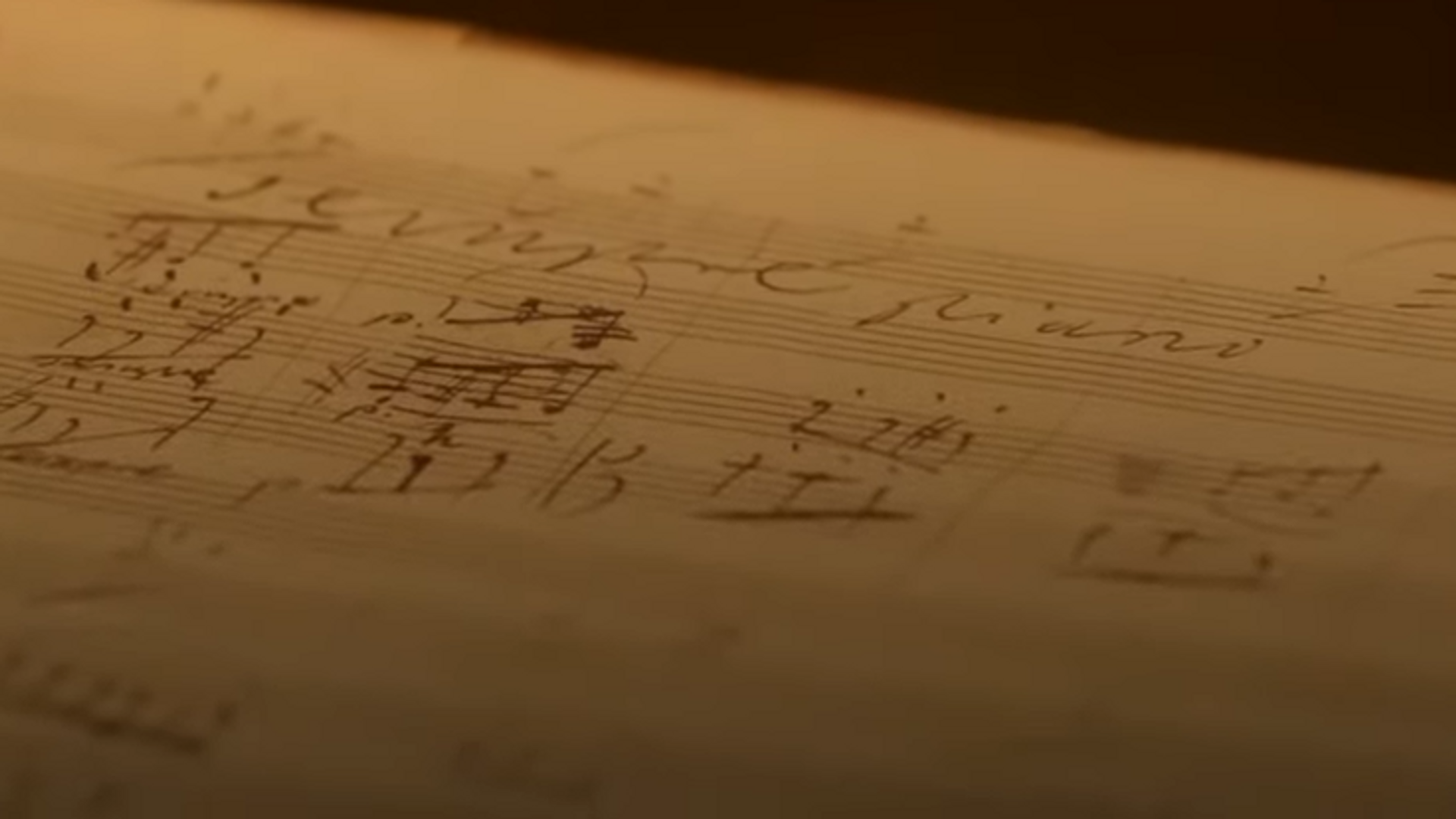https://sputnikglobe.com/20221206/czech-museum-to-return-beethoven-manuscript-to-family-that-fled-nazis-during-holocaust-1105082275.html
Czech Museum to Return Beethoven Manuscript to Family That Fled Nazis During Holocaust
Czech Museum to Return Beethoven Manuscript to Family That Fled Nazis During Holocaust
Sputnik International
A handwritten manuscript by the composer Ludwig van Beethoven has been in the Moravian Museum in the Czech city of Brno for more than 80 years. But before it... 06.12.2022, Sputnik International
2022-12-06T03:56+0000
2022-12-06T03:56+0000
2023-06-20T17:10+0000
ludwig van beethoven
holocaust
holocaust
history
czech republic
jewish
world
https://cdn1.img.sputnikglobe.com/img/07e6/0c/06/1105081978_28:0:764:414_1920x0_80_0_0_032f152211d2273a4d71c9eb92cccb38.png
Beethoven’s handwritten manuscript, which is the original manuscript for the fourth movement of his String Quartet in B-flat Major, Op. 130 will be on display for the first time this week before it is returned to its original heirs.The family who owned the manuscript were the wealthiest family in pre-World War II Czechoslovakia. The family’s wealth came from the mining and banking industries in Central Europe. The Petschek family tried and failed to protect the manuscript by sending it abroad by mail in March of 1939 after German Nazis occupied their country.The manuscript drew the attention of the Gestapo who asked an expert from the Moravian Museum to verify if the manuscript was genuine; however, the individual lied about its authenticity in order to keep it out of Nazi hands. The museum then retained the manuscript in its archives for 80 years as a result.Franz Petschek moved to the United States following the war and struggled to recover the manuscript due to post-war division in Europe. In August of this year the museum made the decision to return the manuscript.It is a rarity, such in the case of the Petschek family, for victims of the Holocaust to be restituted their stolen items. Earlier this year, Anne Webber, co-chair of the London-based Commission for Looted Art in Europe, said that despite 47 countries agreeing more than a decade ago to try and return Jewish communal and religious property to victims of the Holocaust, artworks from this time have yet to be returned.“Some 90% of all artworks being sought today by families have been neither found nor returned,” Webber said at a conference held in Prague last month to review the progress made since the non-binding resolution was made.Beethoven composed the six-movement quartet between 1825 and 1826 as part of a series of late quartets commissioned by Russian Prince Nicholas Galitzin.
czech republic
Sputnik International
feedback@sputniknews.com
+74956456601
MIA „Rosiya Segodnya“
2022
Mary Manley
https://cdn1.img.sputnikglobe.com/img/07e6/01/0b/1092187887_0:0:2048:2049_100x100_80_0_0_0c2cc4c84f89aff034cc55bb01fb6697.jpg
Mary Manley
https://cdn1.img.sputnikglobe.com/img/07e6/01/0b/1092187887_0:0:2048:2049_100x100_80_0_0_0c2cc4c84f89aff034cc55bb01fb6697.jpg
News
en_EN
Sputnik International
feedback@sputniknews.com
+74956456601
MIA „Rosiya Segodnya“
Sputnik International
feedback@sputniknews.com
+74956456601
MIA „Rosiya Segodnya“
Mary Manley
https://cdn1.img.sputnikglobe.com/img/07e6/01/0b/1092187887_0:0:2048:2049_100x100_80_0_0_0c2cc4c84f89aff034cc55bb01fb6697.jpg
ludwig van beethoven, holocaust, holocaust, history, czech republic, jewish
ludwig van beethoven, holocaust, holocaust, history, czech republic, jewish
Czech Museum to Return Beethoven Manuscript to Family That Fled Nazis During Holocaust
03:56 GMT 06.12.2022 (Updated: 17:10 GMT 20.06.2023) A handwritten manuscript by the composer Ludwig van Beethoven has been in the Moravian Museum in the Czech city of Brno for more than 80 years. But before it landed in a museum in the Czech Republic, it had belonged to a family that fled German Nazis during World War II.
Beethoven’s handwritten manuscript, which is the original manuscript for the fourth movement of his String Quartet in B-flat Major, Op. 130 will be on display for the first time this week before it is returned to its original heirs.
The family who owned the manuscript were the wealthiest family in pre-World War II Czechoslovakia. The family’s wealth came from the mining and banking industries in Central Europe. The Petschek family tried and failed to protect the manuscript by sending it abroad by mail in March of 1939 after German Nazis occupied their country.
The manuscript drew the attention of the Gestapo who asked an expert from the Moravian Museum to verify if the manuscript was genuine; however, the individual lied about its authenticity in order to keep it out of Nazi hands. The museum then retained the manuscript in its archives for 80 years as a result.
"The item itself has a fascinating collecting story," says curator Simona Sindlarova. "The whole story reflects the history of Central Europe in the last 200 years."
Franz Petschek moved to the United States following the war and struggled to recover the manuscript due to post-war division in Europe. In August of this year the museum made the decision to return the manuscript.
"Absolutely, it rightly belongs to the Petscheks. It is a question of what will be next. A new chapter of this fascinating collector's story is here," says Sindlarova.
It is a rarity, such in the case of the Petschek family, for victims of the Holocaust to be restituted their stolen items. Earlier this year, Anne Webber, co-chair of the London-based Commission for Looted Art in Europe, said that despite 47 countries agreeing more than a decade ago to try and return Jewish communal and religious property to victims of the Holocaust, artworks from this time have yet to be returned.
“Some 90% of all artworks being sought today by families have been neither found nor returned,” Webber said at a conference held in Prague last month to review the progress made since the non-binding resolution was made.
Beethoven composed the six-movement quartet between 1825 and 1826 as part of a series of late quartets commissioned by Russian Prince Nicholas Galitzin.





